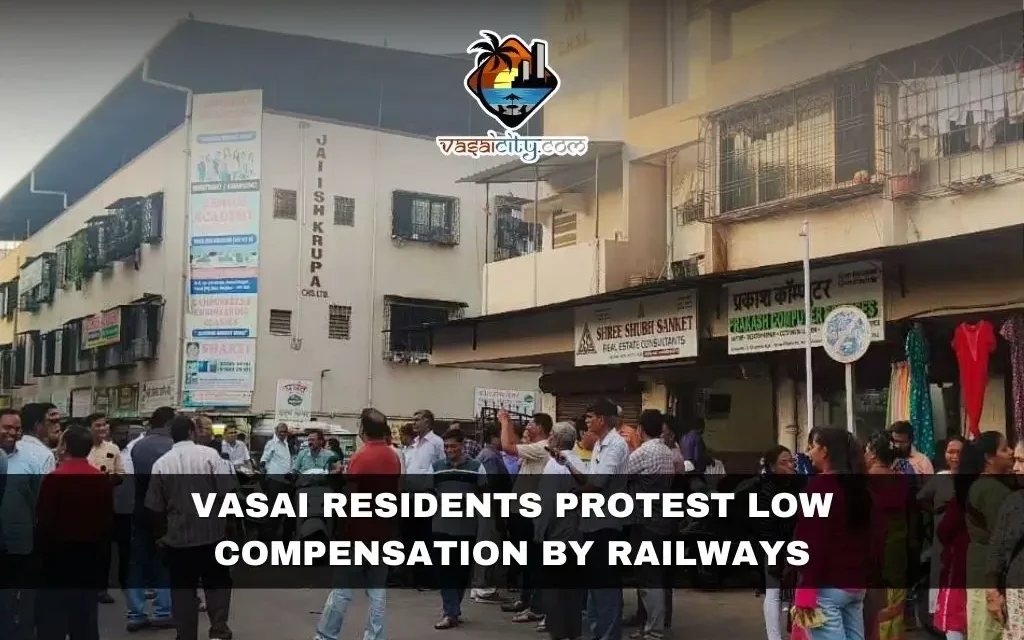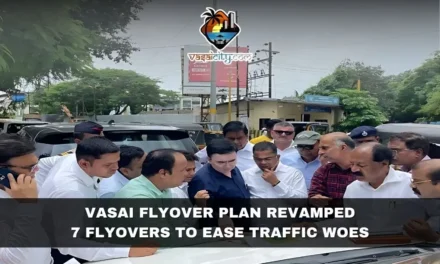A major railway project aimed at improving train connectivity between Borivali and Virar has sparked outrage in Vasai, where residents of six buildings are accusing the Indian Railways of offering compensation that’s far below the actual market value of their properties.
The proposed expansion of the suburban railway line—meant to ease overcrowding and reduce accidents—requires the acquisition of about 16 hectares of land in the Vasai-Virar region. As part of this, the Western Railway plans to construct an additional fifth and sixth rail line between Borivali and Virar. A large yard with 30 tracks is also planned between Vasai and Naigaon. However, the land acquisition process has hit a major roadblock, as families affected by the construction say they’re being unfairly treated.
Who Is Affected?
The affected buildings are located near Vasai Road Railway Station in the Anand Nagar area. They include:
- Shriram Complex (which has hotels and shops),
- Shivshakti Apartment (90 families),
- Sahayog Apartment (40 families),
- Adarsh Apartment (21 families), and
- Jagdish Krupa (50 families).
Additionally, a small portion of the Champa Sadan building is also impacted.
Initially, only parts like compound walls and entryways of these buildings were to be acquired. However, after considering the practical issues and resident concerns, the Railways decided to vacate all five buildings completely. Most of these structures are between 35 and 40 years old.
Residents Cry Foul
The issue started when the Railway authorities sent out eviction notices along with compensation offers. To the shock of residents, the compensation amounts quoted were extremely low—just ₹10 to ₹15 lakh for flats and shop spaces which are currently valued between ₹50 lakh and ₹1 crore in the open market.
“We were assured that compensation would be based on market rates,” says Arun Malviya, one of the residents. “But instead, they are offering us payments based on construction costs alone. That’s not just unfair—it’s illegal.”
According to residents, the Railways have based their compensation on outdated “ready reckoner” rates and construction values, completely ignoring the current real estate prices. “Our homes are worth much more than what they’re offering. Shops here are valued at nearly a crore, but they are offering us peanuts,” Malviya adds.
Legal and Procedural Lapses?
The residents are not just angry; they’re preparing to fight back legally. Many have already served legal notices to the Railway authorities. According to them, the notices issued violate several clauses of the Railways Act of 1989 and 2008, which lay down clear guidelines for fair land acquisition and compensation.
“There are major gaps in the process,” says another resident, Ashok Chaudhary. “The compensation does not consider important factors like the current property rate, amenities, taxes paid, or even the building’s redevelopment potential.”
Another local, Fazle Haal Qureshi, pointed out that the government’s valuation reports are full of errors. “They haven’t even properly considered the floor area ratio (FAR), the infrastructure facilities, or the redevelopment rules. If they want our land, they must either pay full value or give us equivalent houses in the same area.”
Peaceful Protest Turns into Legal Battle
Frustrated by what they believe is a betrayal by the authorities, the affected residents held a peaceful protest against the Railways this Sunday. Many were seen holding placards and shouting slogans demanding fair treatment.
While the Railways have not responded publicly to these allegations, residents are determined to fight. They are planning to approach the courts, and some have already consulted lawyers.
“We’re not against the railway development. In fact, we understand how important it is for the city,” says Qureshi. “But that doesn’t mean we should be thrown out of our homes with nothing in hand. If they want progress, let them pay the right price.”
The Bigger Picture
The Borivali-Virar rail line expansion is part of a broader strategy to decongest Mumbai’s suburban railway network, one of the busiest in the world. Every day, lakhs of commuters struggle with overcrowded trains. The addition of new lines aims to address this growing demand.
But as seen in Vasai, development projects often come at a cost to ordinary citizens—especially when the compensation offered doesn’t match up to what is lost.
With more infrastructure projects in the pipeline across the Mumbai Metropolitan Region, the Vasai case could become a landmark in how urban redevelopment negotiations are handled.
The residents hope their resistance will compel authorities to revise the compensation to a fair market value or offer them alternate housing in the same area.
“We are not beggars. We are homeowners, taxpayers, and citizens who deserve justice,” says a local resident.
As legal proceedings begin to take shape, it remains to be seen whether the authorities will reconsider their offers—or risk delaying a project that could benefit thousands, all because they refused to fairly compensate a few hundred.














